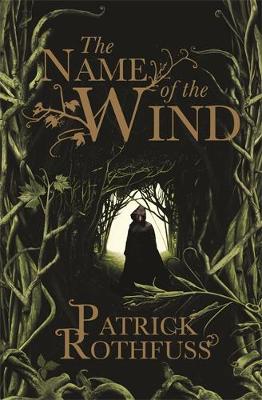"I trouped, travelled, loved, lost, trusted and was betrayed. Write that down and burn it for all the good it will do." (Kote/Kvothe)
I have a reading bucket list - books that I want to read someday, but are too huge, too hyped or too daunting. Once in a blue moon, an opportunity presents itself where a book on my bucket list is staring right at me and telling me to read it. When I saw The Name of the Wind in my university library, I was helpless and couldn't do anything but get it loaned out.
Before I start this review, I have one piece of advice (But, my advice is seldom good advice, so take it with a grain of salt... and sugar). Don't let the first few pages of The Name of the Wind put you off reading it. The first three chapters are slow, boring and have lots of detail and info dumping, but they are necessary and the story picks up afterwards.
The Name of the Wind starts off describing events surrounding the Waystone Inn. The owner of this inn is a man named Kote. When approached (That's the only non-spoilery word I can think of to describe how they meet. It's not entirely accurate.) by a Chronicler, a scribe who writes down stories, we learn that Kote is Kvothe - known to some as a legendary hero and to others, a demon. The Name of the Wind is a story within a story where Kvothe narrates the story of his life, from the time that he was a young boy till the age of 15-16. However, Kvothe's autobiography is not complete and I have so many questions and theories such as Why did Kvothe change his name? Why is he an innkeeper? Who or what is he hiding from? and many other spoilery questions and I'm dying to get them answered.
The world-building in The Name of the Wind is downright awesome. There are so many different areas with different types of people, nationalities, ways of life, languages, beliefs and currencies. The world is intricate, detailed and complex, but it isn't confusing. The magic system is original. The magic in The Name of the Wind is called sympathy and to an extent, is built around scientific information. The magic is grounded in reality and is understandable, but still has a mysterious quality.
I appreciate three things in The Name of the Wind:
1)The whole idea of a university in which magic can be studied.
2)The descriptions of music which makes it feel tangible.
3)A dragon that eats trees!
The Name of the Wind wouldn't be the same without its main character, Kvothe. He is the literal definition of the perfect guy. He is handsome, smart, witty, charming, is good at everything that he does, learns things quickly, can sing, act and play instruments - there is nothing that he can't do. While I don't like this aspect about Kvothe's personality, it's something that I can easily deal with. Kvothe is still a flawed character. He is temperamental, stubborn, reckless and sometimes plain stupid. There's also a divide between the narrator of the story, Kote, and the boy that he used to be, Kvothe, and it's difficult to imagine what caused this change in his characterization and why he is now a shell of his former self, while also understanding that it's entirely possible.
"The best lies about me are the ones I told." (Kote/Kvothe)
Kvothe does steal the show in terms of characterization, but most of the secondary characters are interesting and I have many questions about them too. One gripe is that the female characters are less developed than the male characters. My favourite secondary characters are Elodin, because he is crazy, Auri, because there's something whimsical about her and Devi, because she seems like a badass. My least favourite character is Denna, Kvothe's crush and potential love interest. I don't understand what Kvothe sees in Denna nor do I feel any chemistry between her and Kvothe. Denna also reminds me of Daisy Buchanan (their names both begin with the same letter. Coincidence?) from The Great Gatsby and I dislike Daisy with the fire of a thousand suns.
The Name of the Wind has an awesome world and magic system and an interesting main character. This book leaves you with so many questions and theories, some of which are answered, but most of which aren't (But, will be hopefully be semi-answered in The Wise Man's Fear) I had a fun time reading The Name of the Wind.
"Words are pale shadows of forgotten names. As names have power, words have power. Words can light fires in the minds of men. Words can wring tears from the hardest hearts. There are seven words that will make a person love you. There are ten words that will break a strong man's will. But a word is nothing but a painting of a fire. A name is the fire itself." (Master Elodin)
